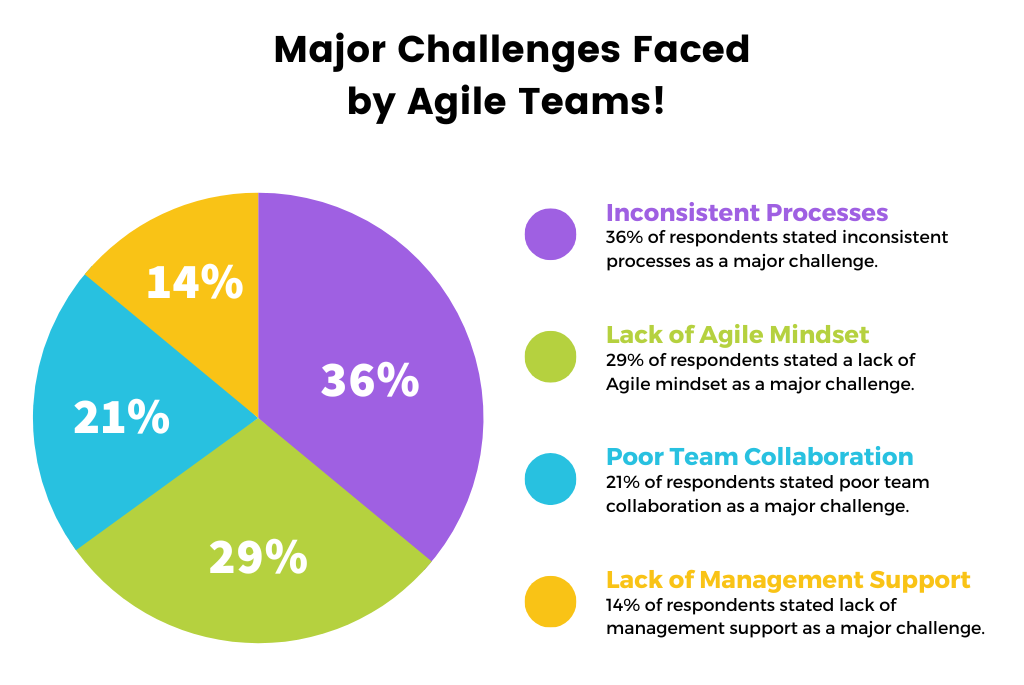Agile methodology has swept the business world by storm, with a staggering 94% of companies embracing its flexible approach, according to the 15th State of Agile Report.
The software development landscape, in particular, has witnessed a remarkable surge in Agile adoption, soaring from 37% in 2020 to an astounding 86% in 2021.
With its flexible approach that prioritizes customer satisfaction and adaptability, Agile empowers teams to deliver exceptional products. However, organizations face a range of challenges as they introduce Agile techniques, practices, and tools. In fact, according to the 15th State of Agile Report, 30% of respondents identified no fewer than ten different challenges encountered during the adoption of Agile.
In our latest survey, we delved into the major challenges faced by Agile teams, shedding light on areas that require attention and improvement. In this article, we explore these challenges as reported by the survey respondents. By gaining insights into these obstacles, teams can develop effective strategies to overcome them and unlock the full potential of Agile methodologies.
Inconsistent Processes:
Consistency in Agile processes is vital for smooth functioning and predictable outcomes. Alarmingly, 36% of survey respondents identified inconsistent processes as a significant challenge. When teams lack standardized processes or fail to adhere to established ones, it can result in inefficiencies, confusion, and compromised product quality.
To tackle this challenge head-on, organizations should emphasize the importance of process adherence and continuous improvement. By establishing clear guidelines and standardizing Agile practices across teams, inconsistencies can be mitigated. Regular retrospectives allow teams to evaluate their processes, identify areas for improvement, and maintain high performance. Encouraging the sharing of best practices and fostering a culture of process excellence and continuous learning enables teams to stay motivated, engaged, and focused on continuous improvement.
Lack of Agile Mindset:
The Agile Manifesto primarily focuses on software development, not business outcomes. Conversely, organizational agility refers to the capability of adapting to changing market conditions, which was never the original objective. Shockingly, 29% of the survey respondents cited a lack of Agile mindset as a significant challenge.
In order to overcome this obstacle, organizations must prioritize creating a culture that embraces Agile principles. Team members can be provided with training and workshops on Agile concepts, enabling them to understand the underlying philosophy and instill an Agile mindset. Encouraging open communication, transparency, and a willingness to experiment and learn from failures can help foster an Agile culture within the team.
Poor Team Collaboration:
Collaboration lies at the heart of Agile methodologies, and any shortcomings in this area can hinder progress.
“If everyone is moving forward together, then success takes care of itself.” – Henry Ford
Approximately 21% of survey respondents identified poor team collaboration as a significant challenge. When team members fail to communicate effectively or work together cohesively, it leads to delays, misunderstandings, and suboptimal outcomes.
To overcome this challenge, organizations should promote a collaborative work environment. Encouraging cross-functional collaboration, promoting knowledge sharing & fostering a culture of trust and psychological safety are crucial. Agile ceremonies such as daily stand-ups, sprint planning meetings, and retrospectives can help facilitate effective communication and collaboration.
Lack of Management Support:
Effective management support is crucial for Agile teams to thrive. 14% of respondents in the survey highlighted the lack of management support as a major challenge. Managers who do not fully grasp the Agile framework may struggle to provide the necessary guidance and resources, hindering team progress.
To address this challenge, organizations should invest in educating managers about Agile methodologies and their benefits. It is essential for managers to understand the Agile mindset and actively support the team’s efforts. Regular communication channels should be established between management and Agile teams to ensure alignment of goals and expectations. Providing managers with the necessary tools and training to enable effective Agile leadership will promote a more conducive environment for Agile success.
Final Thoughts:
In conclusion, Agile methodologies have become increasingly popular in the business world, with a majority of companies adopting its flexible approach. However, the introduction of Agile techniques presents several challenges for organizations. Through our survey, we have identified four common challenges faced by Agile teams: inconsistent processes, lack of an Agile mindset, poor team collaboration, and lack of management support. Understanding these common challenges beforehand can help you address them correctly and thus help you implement Agile methodology more effectively.


